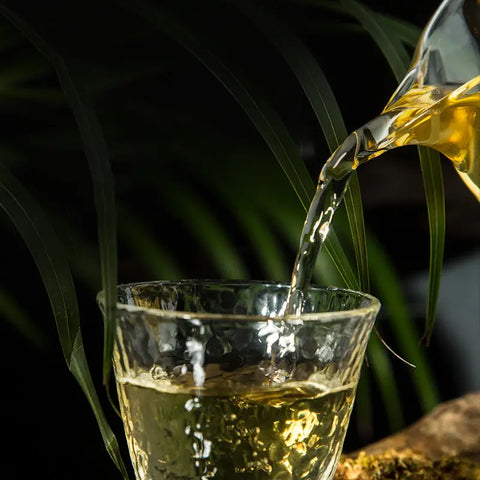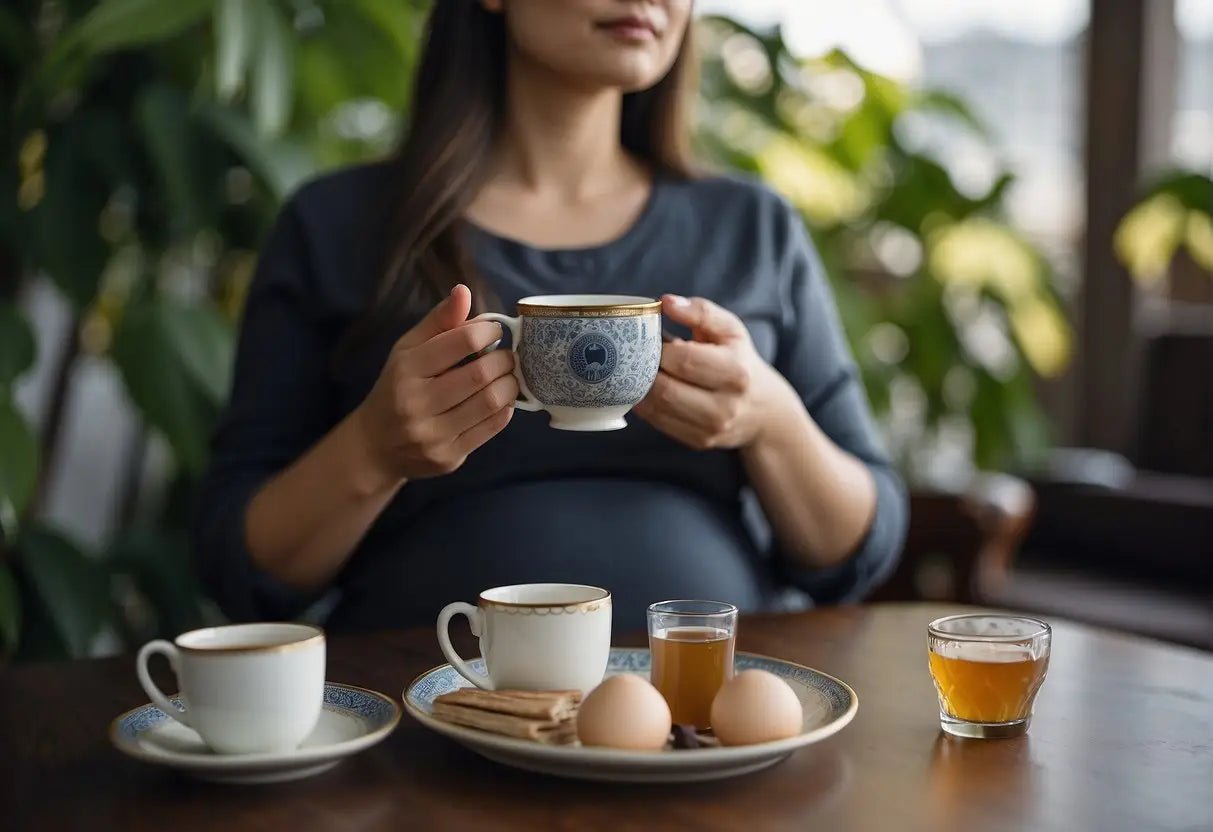Pu-erh Tea Pregnancy Safety
Pu Erh tea, a type of fermented tea, originates from the Yunnan province of China. Recognized for its distinctive preparation method, Pu Erh undergoes a fermentation process that can last for months or even years.
Characteristics:
- Color: Deep, dark red to brown
- Taste: Rich, earthy, and often woodsy
- Aroma: Complex, ranging from floral to musty
Types:
Bestsellers
- Raw (Sheng): Traditionally aged natural fermentation
- Ripe (Shou): Accelerated fermentation process
Processing Steps:
- Harvesting: Selecting the Camellia sinensis leaves.
- Withering: Reducing moisture content to soften leaves.
- Rolling: Shaping the leaves and aiding enzyme oxidation.
- Fermentation: Oxidizing under controlled conditions.
- Drying: Stopping fermentation and reducing moisture for storage.
Health Benefits: Pu Erh is often consumed for potential health benefits, which may include aiding digestion and reducing cholesterol. However, you should exercise discretion and consider health implications, especially during pregnancy.
Remember: Consult with your healthcare provider before adding Pu Erh tea to your diet during pregnancy, as its effects can vary depending on individual health conditions and the fermentation levels of the tea.
Pregnancy and Tea Consumption

When you are pregnant, it's essential to consider the types of tea you consume due to caffeine content and herbal ingredients that may affect your health and the development of your baby.
General Safety
You should consult with your healthcare provider before adding new teas to your diet during pregnancy. Some teas, especially those containing certain herbs, might not be safe to consume, as they could potentially stimulate the uterus or affect hormone levels.
Caffeine Content in Pu Erh Tea
| Type of Pu Erh Tea | Estimated Caffeine Content per 8 oz cup |
|---|---|
| Raw (Unfermented) | 30-45 mg |
| Ripe (Fermented) | 35-50 mg |
Pu Erh tea contains caffeine, which, in large amounts, can pose risks during pregnancy, such as low birth weight or miscarriage. You should limit your caffeine intake to less than 200 mg per day, as recommended by major health organizations.
Herbal Considerations
Pu Erh tea is typically free from other herbs, but it's imperative to read labels if you select a blend containing additional ingredients. Herbs like ginseng, licorice, and other additives potentially have side effects or contraindications during pregnancy. Always exercise caution and seek advice from a professional.
Pu Erh Tea Benefits

Pu Erh tea, a fermented Chinese tea, offers several benefits that you may find interesting.
Digestive Health: Regular consumption of Pu Erh tea can aid in digestion. It has been observed to help maintain a healthy gut flora, which is crucial for digestion.
Metabolic Support: Pu Erh tea may boost your metabolism, aiding in weight management. However, it should be paired with a healthy diet and exercise for best results.
Lao Ban Zhang
Heart Health: The antioxidants in Pu Erh tea can support heart health by helping to maintain healthy cholesterol levels.
Mental Alertness: Thanks to the caffeine content, Pu Erh tea can help increase your alertness and concentration, making it a suitable beverage for your morning routine or afternoon pick-me-up.
Stress Reduction: Some components in Pu Erh tea have been linked to reduced stress and improved mood, although the exact mechanisms are not fully understood.
It’s worth noting that while Pu Erh tea has potential benefits, it should be consumed in moderation, especially during pregnancy. Consult your healthcare provider for personalized advice.
Potential Risks and Side Effects

When considering the consumption of pu-erh tea during pregnancy, it’s important to be aware of potential risks and side effects that may affect both you and your developing baby.
Impact on Fetal Development
Consuming high amounts of caffeine, which is present in pu-erh tea, can cross the placenta and affect your fetus. Studies suggest that high caffeine intake during pregnancy may lead to low birth weight and may increase the risk of fetal growth retardation. The American College of Obstetricians and Gynecologists recommends limiting caffeine intake to less than 200 mg per day during pregnancy to avoid potential risks.
Miscarriage Risks
Research has indicated a correlation between elevated caffeine consumption and miscarriage rates. While findings are not conclusive, moderation is key, as the exact safe level of caffeine is still not clearly established. Due to the caffeine content in pu-erh tea, you should monitor and minimize your intake to reduce potential miscarriage risks.
Hormonal Changes and Pregnancy
During pregnancy, your body experiences significant hormonal changes that can be further influenced by external elements such as diet and caffeine. Pu-erh tea contains caffeine and theophylline, which can cause increased heart rate and blood pressure; these effects may exacerbate pregnancy symptoms such as nausea or insomnia. It's crucial to consider how pu-erh tea might interfere with these hormonal changes.
Recommendations for Consuming Pu Erh Tea During Pregnancy
When considering Pu Erh tea consumption during pregnancy, it's crucial to consult with your healthcare provider. This fermented tea contains caffeine, which should be moderated during pregnancy.
Here are some points to consider:
Caffeine Content
- Limit your intake to the equivalent of 1-2 small cups per day (about 200 mg of caffeine) to avoid potential risks associated with excess caffeine consumption.
Brewing Time
-
To reduce caffeine levels, steep the tea for a shorter duration.
Brewing Time Caffeine Content 1 minute Reduced 3-5 minutes Standard
Quality Matters
- Opt for high-quality, organic Pu Erh tea to ensure it's free from harmful contaminants.
Alternative Options
- If advised to avoid caffeine:
- Herbal teas (such as peppermint or ginger) can be considered as an alternative; ensure they're safe for pregnancy.
Monitoring Your Body
- Pay attention to how you feel after drinking Pu Erh tea and report any unusual symptoms to your healthcare provider.
Remember, each pregnancy is unique. Prioritize your health and the well-being of your baby by seeking personalized advice from a medical professional regarding the consumption of Pu Erh tea or any other caffeinated beverages during pregnancy.
Alternatives to Pu Erh Tea
When considering alternatives to Pu Erh tea during pregnancy, it's important to choose beverages that are low in caffeine and safe for both you and your baby. Here are some options:
-
Herbal Teas: (Caffeine-free & Generally considered safe)
- Rooibos: Known for its calming properties.
- Peppermint: May help with digestion and nausea.
- Ginger: Often recommended for its anti-nausea effects.
-
Decaffeinated Teas: (Minimal caffeine)
- Decaf Green Tea: Retains antioxidants without the caffeine content.
- Decaf Black Tea: Offers a similar taste to Pu Erh tea but decaffeinated.
-
Fruit Infusions: (Naturally caffeine-free)
- Lemon water: Hydrating and provides vitamin C.
- Berry infusions: Rich in antioxidants and natural sweetness.
Remember to consult with your healthcare provider before adding new herbal teas to your diet, as some herbs can have medicinal effects. It's also advisable to check the labels for any additional ingredients and ensure they're made from pure, high-quality sources to avoid any potential risks to your pregnancy.
Frequently Asked Questions

The following FAQs address your concerns about Pu-erh tea consumption during pregnancy, comparing its caffeine content, the potential health benefits, first trimester consumption implications, side effects to be aware of, and any impact on birth control efficacy.
Is it safe to consume Pu-erh tea during pregnancy?
While some pregnant women choose to drink Pu-erh tea, it's essential to consult your healthcare provider before including it in your diet as its caffeine content could pose risks.
How does Pu-erh tea compare in caffeine content to other teas and is it appropriate during pregnancy?
Pu-erh tea generally has a higher caffeine content than white or green teas but less than black tea or coffee. When pregnant, you should limit your caffeine intake to the recommended guidelines provided by your healthcare professional.
What are the potential health benefits of drinking Pu-erh tea while expecting?
Pu-erh tea may offer health benefits, including aiding digestion and reducing stress, which might be beneficial during pregnancy. However, weigh these potential benefits with the caffeine intake and any health concerns by consulting with your doctor.
Can drinking Pu-erh tea in the first trimester affect pregnancy outcomes?
Caffeine consumption, including that from Pu-erh tea, is often advised to be minimized during the first trimester due to a potential increased risk of miscarriage. Discuss any tea consumption with your healthcare provider.
Are there any particular side effects of Pu-erh tea that pregnant women should be aware of?
Pregnant women may experience increased sensitivity to caffeine, and side effects from Pu-erh tea can include insomnia, increased heart rate, and digestive discomfort. Always keep your doctor informed of any adverse effects you experience.
Does the consumption of Pu-erh tea have any implications on birth control efficacy?
There is no direct evidence to suggest that Pu-erh tea affects birth control efficacy. However, if you are considering pregnancy or are currently pregnant, focus on potential impacts on your pregnancy instead of birth control.
← Older post Newer post →











